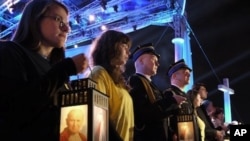As the late Pope John Paul II is beatified in the Vatican, many in his home country, Poland, are jubilant. But Poland’s attachment to the late Pope stems from more than just national pride, since many credit him with helping to overthrow the communist state.
In the town of Wadowice in southern Poland, John Paul II is everywhere. His face flutters from flags lining the streets, and he beams down on passers by from statues and photographs. Wadowice is the late Pope’s home town. He was born Karol Wojtyla in 1920, in a three-room flat that now houses a museum filled with his personal affairs - his cradle, his skis and a doily made by his mother.
John Paul II is set to be beatified on Sunday, the first step on the road to sainthood. In Wadowice, tens of thousands of people, including the Polish Prime Minister, are expected to descend on the main square to watch a live broadcast of the ceremony. Marek Dyjaczynski, who works for the museum, explains that while the late Pope was important to Poles, Poland was also of vital importance to him.
"The problems of his country were important for him. The whole time he was Pope, he thought about his country. He talked to Poles, and he tried to motivate them to change something, especially before 1989," he said.
John Paul II was the first non-Italian Pope since the 16th century, and the first Polish Pope in history. But the sense of attachment many Poles feel toward him has as much to do with politics as with religion.
According to historian Tadeusz Ruzikowski of the Warsaw-based Institute of National Remembrance, the Pope’s visit to Poland in 1979 dealt an important blow to the communist regime of the time. The Solidarity trade union was born the following year, and went on to spearhead the overthrow of communism in the Eastern Bloc.
"For a few decades, the government tried to show the Polish People’s Republic as the natural consequence of history, and the values - Leninism, Marxism, and so on - were the best for the people. The visit of John Paul II in 1979 showed that hundreds of thousands of people, even millions of people, share other values than those of the government. It is said by historians that without this first visit of John Paul II in Poland, it could be not possible to form Solidarity in 1980. He gave people hope, he gave people more courage to express their real attitude toward many issues," he said.
He adds that to many Poles, the sense of moral support from the Vatican played a crucial role in encouraging people in their struggle against the communist authorities. "It was very important for Polish people to have consciousness that outside Poland is a person who understands our problems, who wishes us all the best. In the outside world, this was the person who spoke with our voice, because he personally experienced what communism was, what repression took place in Poland for many years," he said.
Since his death in 2005, statues and images of John Paul II have proliferated in Poland. His face is emblazoned on countless t-shirts, and you can even buy Pope-shaped garden gnomes. Not everyone is happy with the way his memory has been popularized, including Julia Koszewska of the Warsaw-based Club of Catholic Intellectuals.
"We have many monuments. Sometimes all of his life, all of his teachings, all of the actions that he made are put into one material object, and I think it’s a very dangerous thing because it could lead to forgetting about the real meaning. For the beatification there are already plenty of badges and baseball caps, almost everything you can imagine. What is needed is deeper reflection about what he really was," he said.
Still, for many Poles, their relationship with John Paul II is deeply personal.
One woman, gazing at the exhibits in the Family Home of the John Paul II Museum in Wadowice, explains that the late Pope is very important for her and her family because she was pregnant when he died, and she will always remember the emotional outpouring that followed. She says that like all of Poland, she is very proud of him.
Since the late Pope’s death, thousands of people have come to Wadowice each year to see the place where he was born. Thanks to the beatification on Sunday, the town expects many more visitors in the years to come.




